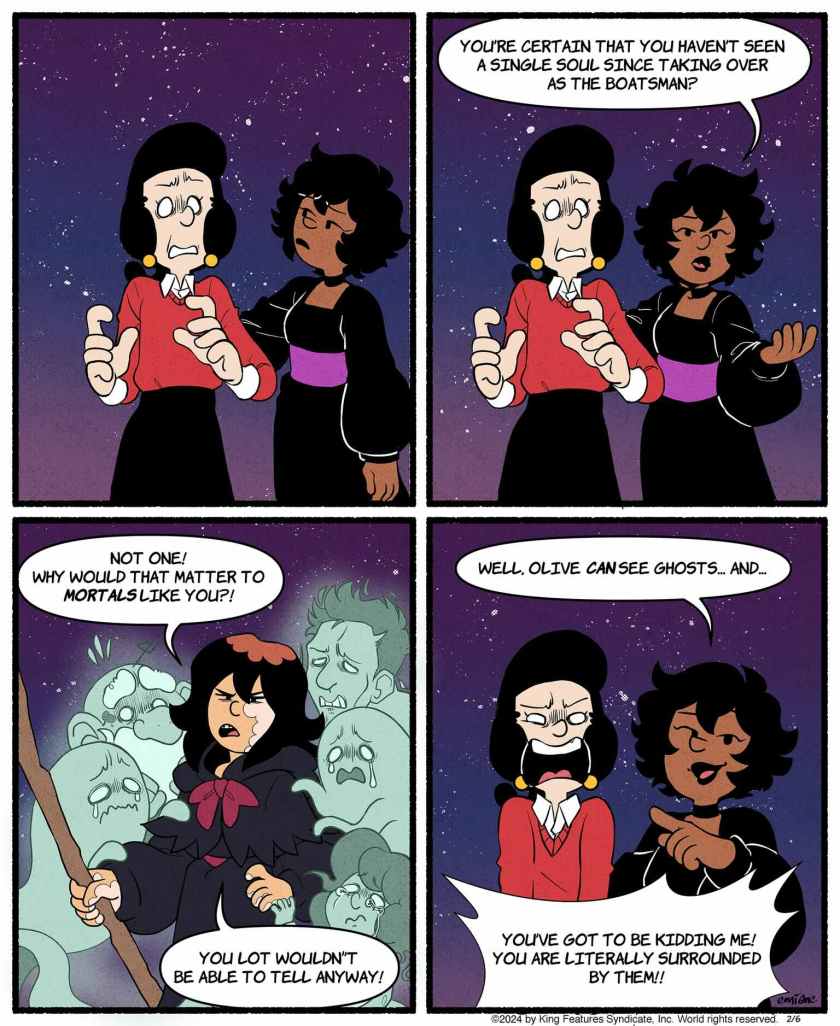The current lead villain in the Popeye side of Emi Burdge and Randy Milholland’s Olive and Popeye is Bunzo, whom you remember from … 1931. It was mentioned in the strip but you might have missed. Way back during Herbert Hoover’s presidency, when Popeye and gang first journeyed to King Blozo’s kingdom, Bunzo was General in charge of the army or whatnot. And wanted the kingdom for himself, certainly more than Blozo wanted it, so there we go. Then it turned out running kingdoms is hard, especially when you have Blozo and the people who put up with being ruled by Blozo on your side. Since then, the Popeye wiki tells me, he’s made other appearances like in that comic book series from twelve years ago and in the current story.
So this should catch you up to late February 2024 in the Olive and Popeye side strip. There haven’t been any continuity-heavy bits of anything going on in the main Sunday Thimble Theatre comics. If you’re reading this after about May 2024, there’s probably a more up-to-date recap here. If there’s not, there’s not. Life is complicated, you know?
Olive and Popeye.
5 December 2023 – 26 February 2024.
Popeye, following the map of Plaidfoot the Pirate, had just got captured by an unbreakable bubble. O G Wotasnozzle apologizes; he had no choice in the matter. He was being compelled by Popeye’s greatest enemy … Bunzo.
Yes, it’s another archive pull for Randy Milholland. He includes a footnote giving the dates, very helpful if you have the Complete Segar Popeye reprints, less helpful if you have to dig around the Comics Kingdom archives. (The story should be coming up in the next year, though, if Comics Kingdom doesn’t blow up everything in its redesign later this week.) Blozo, realizing power without responsibility is the best, has moved into CEO work, in the business of selling himself. And it’ll help him get going if he has, say, the ancient treasure of Plaidfoot the Pirate. And what can stop him, as long as Popeye is trapped inside Wotasnozzle’s unbreakable bubble?
Well, there’s Wotasnozzle breaking the bubble. And giving the bad news that Bunzo is searching for treasure using both Wotasnozzle’s robots and enslaved townspeople. Who can punch their way through all this trouble, besides Popeye and Rip Haywire? Fortunately we have a Popeye on hand.

Meanwhile in Olive’s story … all those many ghosts she keeps seeing let her know that the “old boatman” meant to escort them to the other side has disappeared. The gang find a cloaked boatman figure wandering around the harbor, though. Olive runs up to ask Charon what’s going on and … gets yelled at for grabbing Hel, a young woman who turns out to be Charon’s granddaughter. He’s on vacation, and she’s filling in to build character and whatnot. But she hasn’t seen a single ghost since taking up the oar.
Olive can not believe this. Petunia offers that maybe Hel will develop her own ghost sight. Hel decides that Olive Oyl will mentor her in the ghost-seeing and managing business, and we’ll just see what Olive makes of that, then.
Next Week!
A certain time-travelling caveman decides to go and invent bestseller authorship and the kind of unthinkable, unreasoning wealth Bunzo hopes for. It’s Jonathan Lemon and Joey Alison Sayers’s Alley Oop next Tuesday, all going well. See you then.
